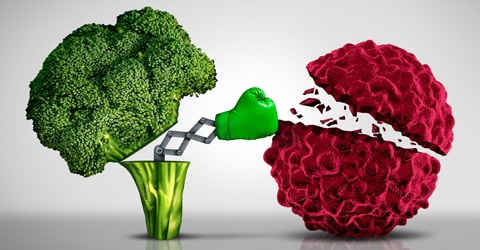

In light of the continued spread of COVID-19, many people have taken a new interest in the relationship between nutrition and immunity—a welcome and encouraging development, despite the negative circumstances. Unfortunately, though, this interest has also opened the door to a great deal of confusing, misleading, or even blatantly false information.
Let’s stick to the evidence, starting with the most fundamental observation: Those most at risk of contracting respiratory illnesses, such as COVID-19, are those with compromised or weakened immune responses.
So, how can we strengthen our immune responses?
More Fruits and Vegetables
One randomized controlled trial studied this question in elderly patients, who are generally at greatest risk of developing respiratory infections.[1] Patients randomly assigned to the experimental group were asked to increase their consumption of fruits and vegetables to five portions per day. Meanwhile, those in the control group were encouraged to continue with their normal diets (closer to two portions per day). The results, though maybe not surprising, were clear: those who ate more fruits and vegetables saw a significant increase in nutrients critical to the immune system, such as in vitamin C, lycopene and zeaxanthin, as well as a significantly enhanced antibody response following vaccination. Researchers conclude that there is a link between this “achievable dietary goal [and] improved immune function.”
Eat Less Fat
In another study, researchers investigated the effects of high-carbohydrate, reduced-fat diets (26 percent of calories from fat) and high-carbohydrate, low-fat diets (15 percent of calories from fat) during three six-week phases, followed by a fourth phase that included calorie restriction.[2] They concluded that low-fat diets combined with weight loss could have: “a beneficial effect on cell-mediated immunity.” Moreover, other research corroborates this relationship between low-fat diets and improved immunity; one study even observed a link between reduced-fat diets (20 percent of calories) and the increased activity of natural killer cells, an important component of the immune system’s response to cancer.[3]
Whole Food, Plant-Based Lifestyle
These positive effects are especially encouraging because they were achieved by relatively modest changes to the diet. In other words, the changes studied above represent neither the optimal diet nor the optimal immune response. Compared to more comprehensive changes—such as those achieved by a low-fat, whole food, plant-based (WFPB) diet, which contains approximately 10 percent of calories from fat—the 15 and 20 percent fat protocols studied above are moderate. And yet, still, they show a significant ability to improve immune responses.
Of course, a strong immune system will never guarantee a rapid, full recovery in every case, particularly when it comes to new viruses like COVID-19. Normal precautions and advice should, of course, also be followed, and other lifestyle factors such as sleep, exercise, and good personal hygiene are very important.
But strengthening our immune systems can only help, and there is a wealth of evidence indicating the same thing: what we eat does matter.[4][5] In addition to the intervention studies already mentioned above, this includes several epidemiological studies, for several disease categories.[6] [7][8][9] In short, the more whole plant foods we eat, especially fruits and vegetables, the better. The less fat we consume, the better. The closer we get to these recommendations, as with a low-fat, WFPB diet, the better.
Immune Boosting Foods?
Lastly and in addition to these more general recommendations, several specific foods and drinks have been associated with improved immune response, including:
A word of caution, though—these foods should not be considered extraordinary only in isolation. The WFPB diet’s ability to reinforce immunity should not be attributed only to these individual foods’ properties, but also to the synergistic relationship between each and every component they contain. As always, their empowering effects will be most profound when consumed as part of a broad, diverse WFPB diet.
References
- Gibson A, Edgar JD, Neville CE, Gilchrist SE, McKinley MC, Patterson CC, Young IS, Woodside JV. Effect of fruit and vegetable consumption on immune function in older people: a randomized controlled trial. Am J Clin Nutr. 2012 Dec;96(6):1429-36. doi: 10.3945/ajcn.112.039057. Epub 2012 Nov 7.
- Santos M. Immunological effects of low-fat diets with and without weight loss. J Am Coll Nutr. 20 03 Apr;22(2):174-82.
- Hebert, J. R., Barone, J., Reddy, M. M., & Backlund, J.-Y. C. (1990). Natural killer cell activity in a longitudinal dietary fat intervention trial. Clinical Immunology and Immunopathology, 54(1), 103–116.doi:10.1016/0090-1229(90)90010-n
- Watzl, B., Bub, A., Briviba, K., & Rechkemmer, G. (2003). Supplementation of a Low-Carotenoid Diet with Tomato or Carrot Juice Modulates Immune Functions in Healthy Men. Annals of Nutrition and Metabolism, 47(6), 255–261.doi:10.1159/000072397
- Li, L., & Werler, M. M. (2009). Fruit and vegetable intake and risk of upper respiratory tract infection in pregnant women. Public Health Nutrition, 13(02), 276. doi:10.1017/s1368980009990590
- Steinmetz, K. A., & Potter, J. D. (1991). Vegetables, fruit, and cancer. II. Mechanisms. Cancer Causes and Control, 2(6), 427–442. doi:10.1007/bf00054304
- Block, G., Patterson, B., & Subar, A. (1992). Fruit, vegetables, and cancer prevention: A review of the epidemiological evidence. Nutrition and Cancer, 18(1), 1–29.doi:10.1080/01635589209514201
- Key TJA, Thorogood M, Appleby PN & Burr ML (1996) Dietary habits and mortality in 11 000 vegetarians and health conscious people: results of a 17 year follow up. British Medical Journal 313, 775–779.
- Ness, A. R., & Powles, J. W. (1997). Fruit and vegetables, and cardiovascular disease: a review. International Journal of Epidemiology, 26(1), 1–13.doi:10.1093/ije/26.1.1
- Ried, K. (2016). Garlic Lowers Blood Pressure in Hypertensive Individuals, Regulates Serum Cholesterol, and Stimulates Immunity: An Updated Meta-analysis and Review. The Journal of Nutrition, 146(2), 389S–396S.doi:10.3945/jn.114.202192
- Josling, P. (2001). Preventing the common cold with a garlic supplement: A double-blind, placebo-controlled survey. Advances in Therapy, 18(4), 189–193. doi:10.1007/bf02850113
- Charron, C. S., Dawson, H. D., Albaugh, G. P., Solverson, P. M., Vinyard, B. T., Solano-Aguilar, G. I., … Novotny, J. A. (2015). A Single Meal Containing Raw, Crushed Garlic Influences Expression of Immunity- and Cancer-Related Genes in Whole Blood of Humans. The Journal of Nutrition, 145(11), 2448–2455. doi:10.3945/jn.115.215392
- Matsumoto, K., Yamada, H., Takuma, N., Niino, H., & Sagesaka, Y. M. (2011). Effects of Green Tea Catechins and Theanine on Preventing Influenza Infection among Healthcare Workers: A Randomized Controlled Trial. BMC Complementary and Alternative Medicine, 11(1). doi:10.1186/1472-6882-11-15
- Park, M., Yamada, H., Matsushita, K., Kaji, S., Goto, T., Okada, Y., … Kitagawa, T. (2011). Green Tea Consumption Is Inversely Associated with the Incidence of Influenza Infection among Schoolchildren in a Tea Plantation Area of Japan. The Journal of Nutrition, 141(10), 1862–1870.doi:10.3945/jn.110.137547
- Song, J.-M., Lee, K.-H., & Seong, B.-L. (2005). Antiviral effect of catechins in green tea on influenza virus. Antiviral Research, 68(2), 66–74.doi:10.1016/j.antiviral.2005.06.010
- M A Skinner. Wellness Foods Based on the Health Benefits of Fruit: Gold Kiwifruit for Immune Support and Reducing Symptoms of Colds and Influenza. Journal of Food and Drug Analysis, Vol. 20, Suppl. 1, 2012, Pages 261-264
- Hunter, D. C., Skinner, M. A., Wolber, F. M., Booth, C. L., Loh, J. M. S., Wohlers, M., … Kruger, M. C. (2011). Consumption of gold kiwifruit reduces severity and duration of selected upper respiratory tract infection symptoms and increases plasma vitamin C concentration in healthy older adults. British Journal of Nutrition, 108(07), 1235–1245.doi:10.1017/s0007114511006659
- Stonehouse, W., Gammon, C. S., Beck, K. L., Conlon, C. A., von Hurst, P. R., & Kruger, R. (2013). Kiwifruit: our daily prescription for health. Canadian Journal of Physiology and Pharmacology, 91(6), 442–447.doi:10.1139/cjpp-2012-0303
- Jeong, S. C., Koyyalamudi, S. R., & Pang, G. (2012). Dietary intake of Agaricus bisporus white button mushroom accelerates salivary immunoglobulin A secretion in healthy volunteers. Nutrition, 28(5), 527–531.doi:10.1016/j.nut.2011.08.005
- Moro, C., Palacios, I., Lozano, M., D’Arrigo, M., Guillamón, E., Villares, A., … García-Lafuente, A. (2012). Anti-inflammatory activity of methanolic extracts from edible mushrooms in LPS activated RAW 264.7 macrophages. Food Chemistry, 130(2), 350–355.doi:10.1016/j.foodchem.2011.07.049
Copyright 2026 Center for Nutrition Studies. All rights reserved.
Deepen Your Knowledge With Our
Plant-Based Nutrition
Certificate
Plant-Based Nutrition Certificate
- 23,000+ students
- 100% online, learn at your own pace
- No prerequisites
- Continuing education credits







